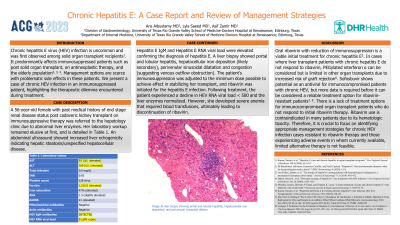Tuesday Poster Session
Category: Liver
P4000 - Chronic Hepatitis E: A Case Report and Review of Management Strategies
Tuesday, October 24, 2023
10:30 AM - 4:00 PM PT
Location: Exhibit Hall

Has Audio
- AA
Ans Albustamy, MD
DHR
McAllen, Texas
Presenting Author(s)
Ans Albustamy, MD1, Lyla Saeed, MD2, Fernando Membreno, MD3, Asif Zamir, MD, FACG4
1DHR, McAllen, TX; 2UTRGV, McAllen, TX; 3DHR, Edinburg, TX; 4DHR Health Gastroenterology, Edinburg, TX
Introduction: Chronic hepatitis E virus (HEV) infection is uncommon and was first observed among immunosuppressed solid organ transplant recipients. Management options are limited but if left untreated may progress to fibrosis and cirrhosis. Our case discusses the therapeutic dilemma of treating chronic Hep E in setting of immunosuppression thus demonstrating the need for further research to explore therapeutic options for treating hepatitis E infection.
Case Description/Methods: A 56-year-old female with past medical history of end stage renal disease status post cadaveric kidney transplant on immunosuppressive therapy was referred to the hepatology clinic due to abnormal liver enzymes. An abdominal ultrasound showed increased liver echogenicity indicating hepatic steatosis/unspecified hepatocellular disease. Extensive initial laboratory work up revealed presence of HEV IgM antibody and elevated HEV RNA viral load confirming the diagnosis of hepatitis E.
Liver biopsy showed portal and lobular hepatitis with increased iron deposition (likely secondary) and no evidence of fibrosis by trichrome stain. The patient's immunosuppression was reduced to the minimum tolerable dose and ribavirin was initiated. Following treatment, the patient experienced a decline in HEV RNA viral load < 500 and the liver enzymes normalized. However, she developed severe anemia that required blood transfusions, leading to discontinuation of ribavirin. Patient’s kidney allograft function remained normal.
Discussion: Oral ribavirin with reduction of immunosuppressive agents is currently the initial treatment for chronic hepatitis E. In liver transplant patients with chronic hepatitis E who do not respond to ribavirin, PEGylated interferon α can be considered. However its utility is limited in other organ transplants due to increased risk of graft rejection. Other medications such as Sofosbuvir show potential as an antiviral for immunocompromised patients with chronic HEV, but more data is required before it can be considered a reliable treatment option for ribavirin-resistant patients. Our case highlights the need for identifying appropriate management strategies for cases of chronic HEV that are either resistant to ribavirin therapy or those experiencing adverse events.
Disclosures:
Ans Albustamy, MD1, Lyla Saeed, MD2, Fernando Membreno, MD3, Asif Zamir, MD, FACG4. P4000 - Chronic Hepatitis E: A Case Report and Review of Management Strategies, ACG 2023 Annual Scientific Meeting Abstracts. Vancouver, BC, Canada: American College of Gastroenterology.
1DHR, McAllen, TX; 2UTRGV, McAllen, TX; 3DHR, Edinburg, TX; 4DHR Health Gastroenterology, Edinburg, TX
Introduction: Chronic hepatitis E virus (HEV) infection is uncommon and was first observed among immunosuppressed solid organ transplant recipients. Management options are limited but if left untreated may progress to fibrosis and cirrhosis. Our case discusses the therapeutic dilemma of treating chronic Hep E in setting of immunosuppression thus demonstrating the need for further research to explore therapeutic options for treating hepatitis E infection.
Case Description/Methods: A 56-year-old female with past medical history of end stage renal disease status post cadaveric kidney transplant on immunosuppressive therapy was referred to the hepatology clinic due to abnormal liver enzymes. An abdominal ultrasound showed increased liver echogenicity indicating hepatic steatosis/unspecified hepatocellular disease. Extensive initial laboratory work up revealed presence of HEV IgM antibody and elevated HEV RNA viral load confirming the diagnosis of hepatitis E.
Liver biopsy showed portal and lobular hepatitis with increased iron deposition (likely secondary) and no evidence of fibrosis by trichrome stain. The patient's immunosuppression was reduced to the minimum tolerable dose and ribavirin was initiated. Following treatment, the patient experienced a decline in HEV RNA viral load < 500 and the liver enzymes normalized. However, she developed severe anemia that required blood transfusions, leading to discontinuation of ribavirin. Patient’s kidney allograft function remained normal.
Discussion: Oral ribavirin with reduction of immunosuppressive agents is currently the initial treatment for chronic hepatitis E. In liver transplant patients with chronic hepatitis E who do not respond to ribavirin, PEGylated interferon α can be considered. However its utility is limited in other organ transplants due to increased risk of graft rejection. Other medications such as Sofosbuvir show potential as an antiviral for immunocompromised patients with chronic HEV, but more data is required before it can be considered a reliable treatment option for ribavirin-resistant patients. Our case highlights the need for identifying appropriate management strategies for cases of chronic HEV that are either resistant to ribavirin therapy or those experiencing adverse events.
Laboratory values
| AST | 93 IU/L |
| ALT | 160 IU/L |
| Total Bilirubin | 0.6 mg/dL |
| INR | 0.92 |
| Platelet count | 228,000/uL |
| HEV IgM antibody | Detected |
| HEV viral load | 91,600 copies |
Disclosures:
Ans Albustamy indicated no relevant financial relationships.
Lyla Saeed indicated no relevant financial relationships.
Fernando Membreno indicated no relevant financial relationships.
Asif Zamir indicated no relevant financial relationships.
Ans Albustamy, MD1, Lyla Saeed, MD2, Fernando Membreno, MD3, Asif Zamir, MD, FACG4. P4000 - Chronic Hepatitis E: A Case Report and Review of Management Strategies, ACG 2023 Annual Scientific Meeting Abstracts. Vancouver, BC, Canada: American College of Gastroenterology.
